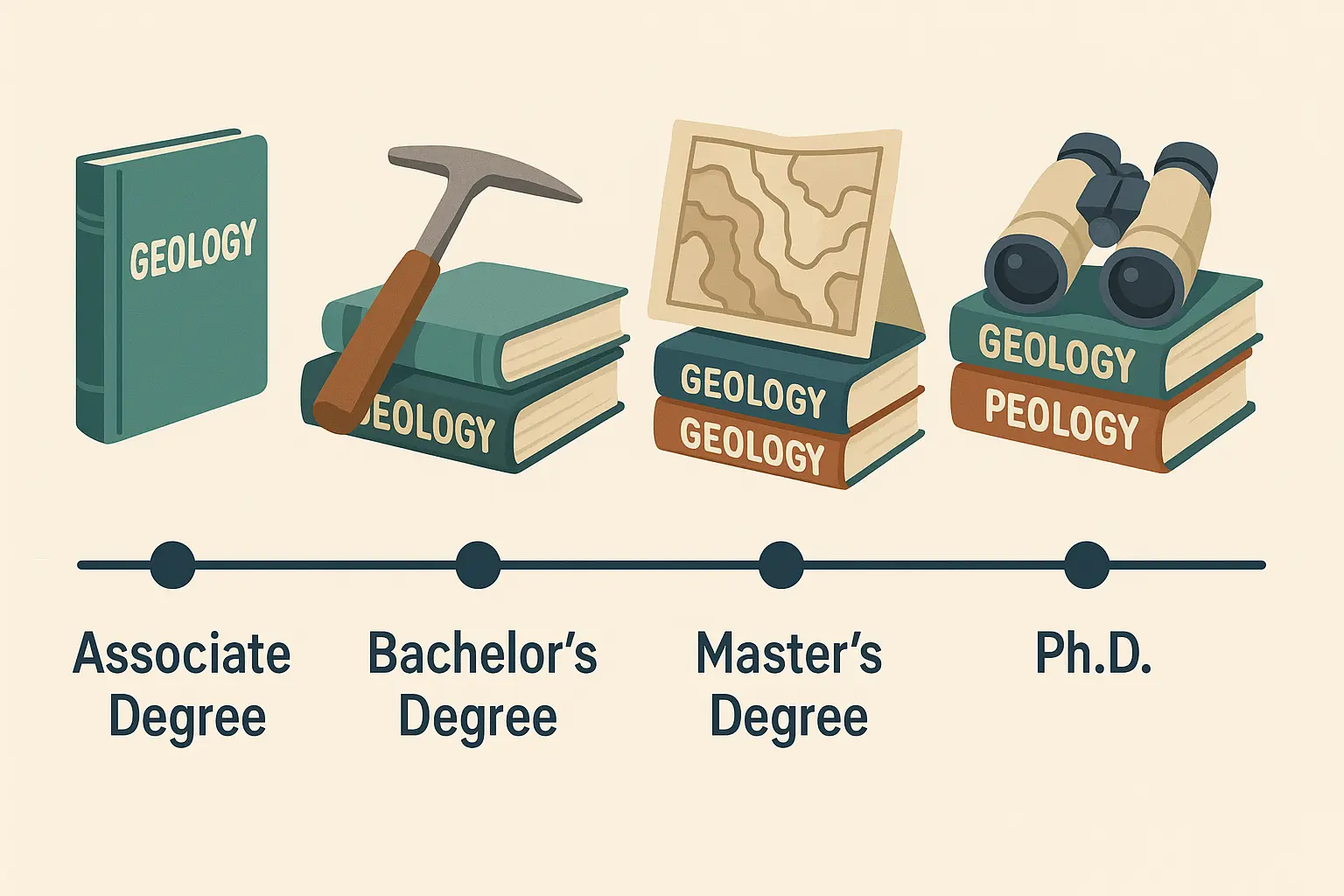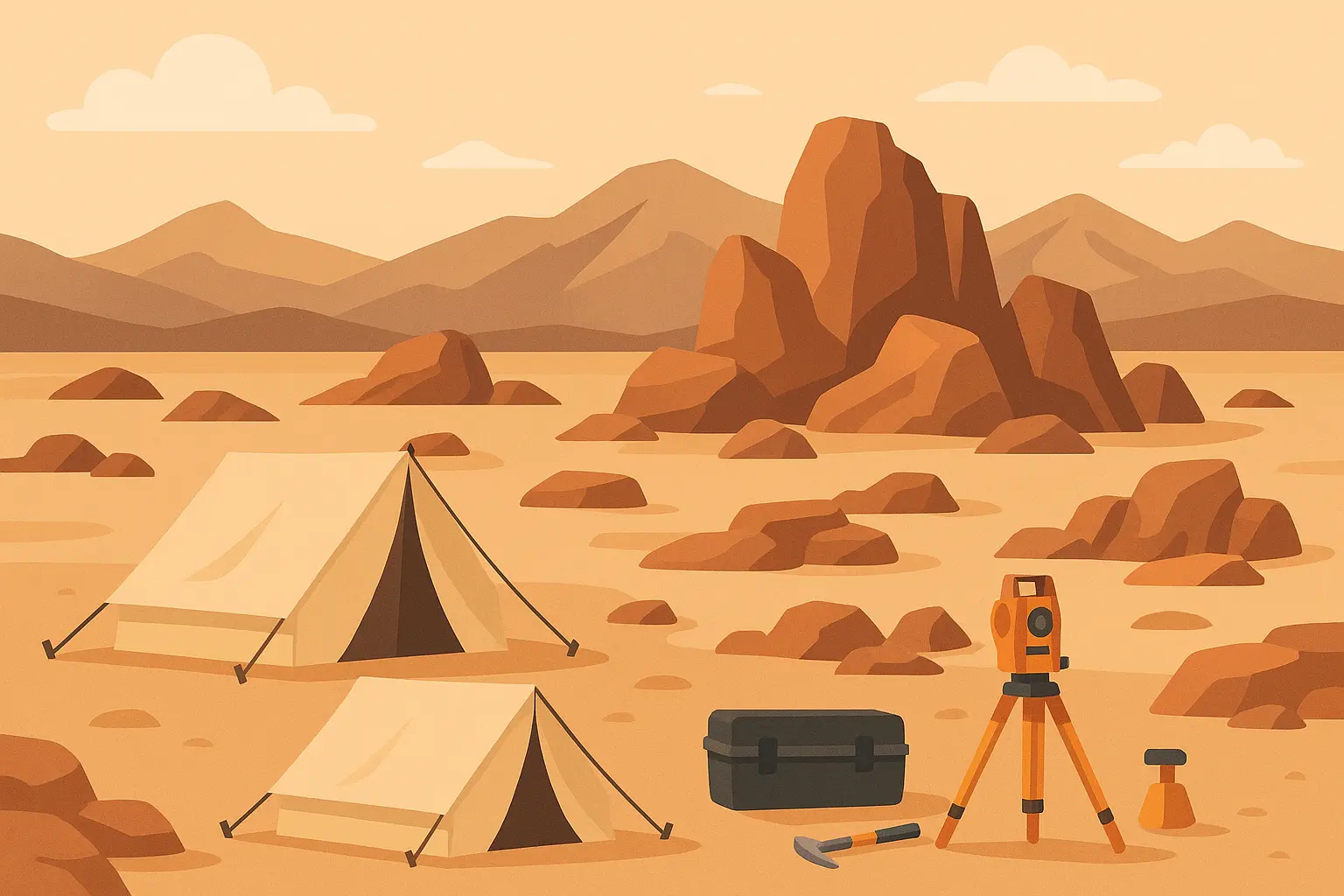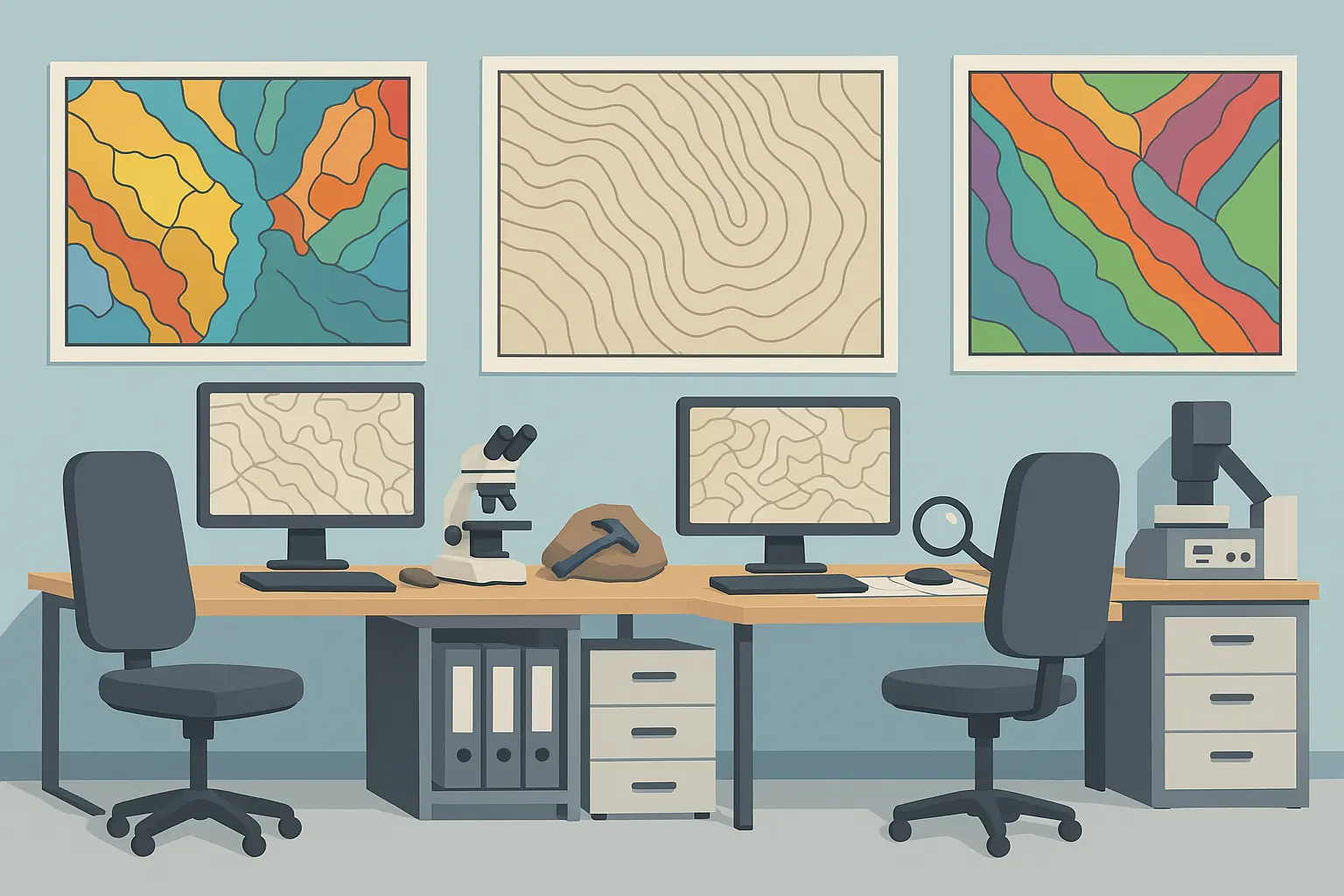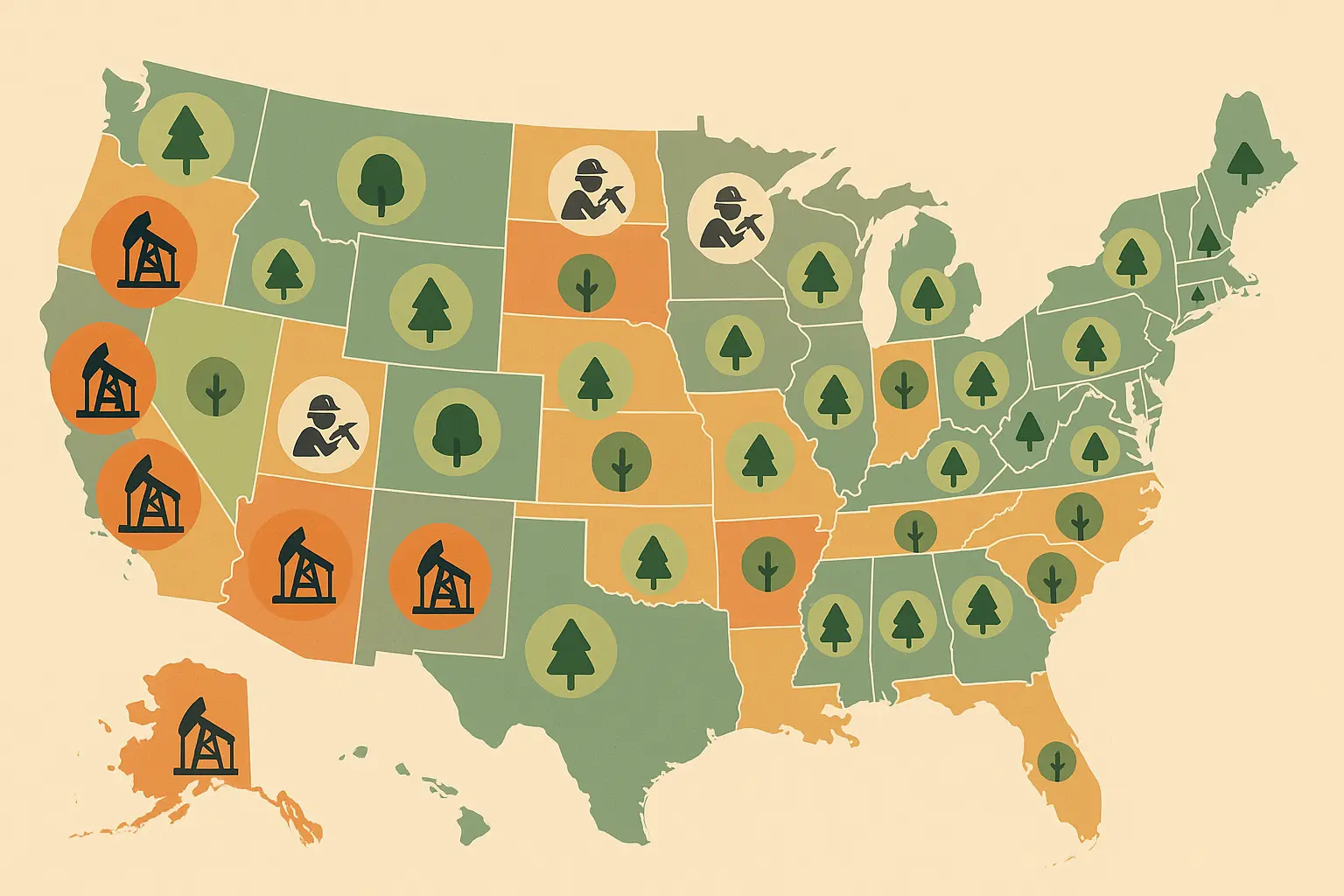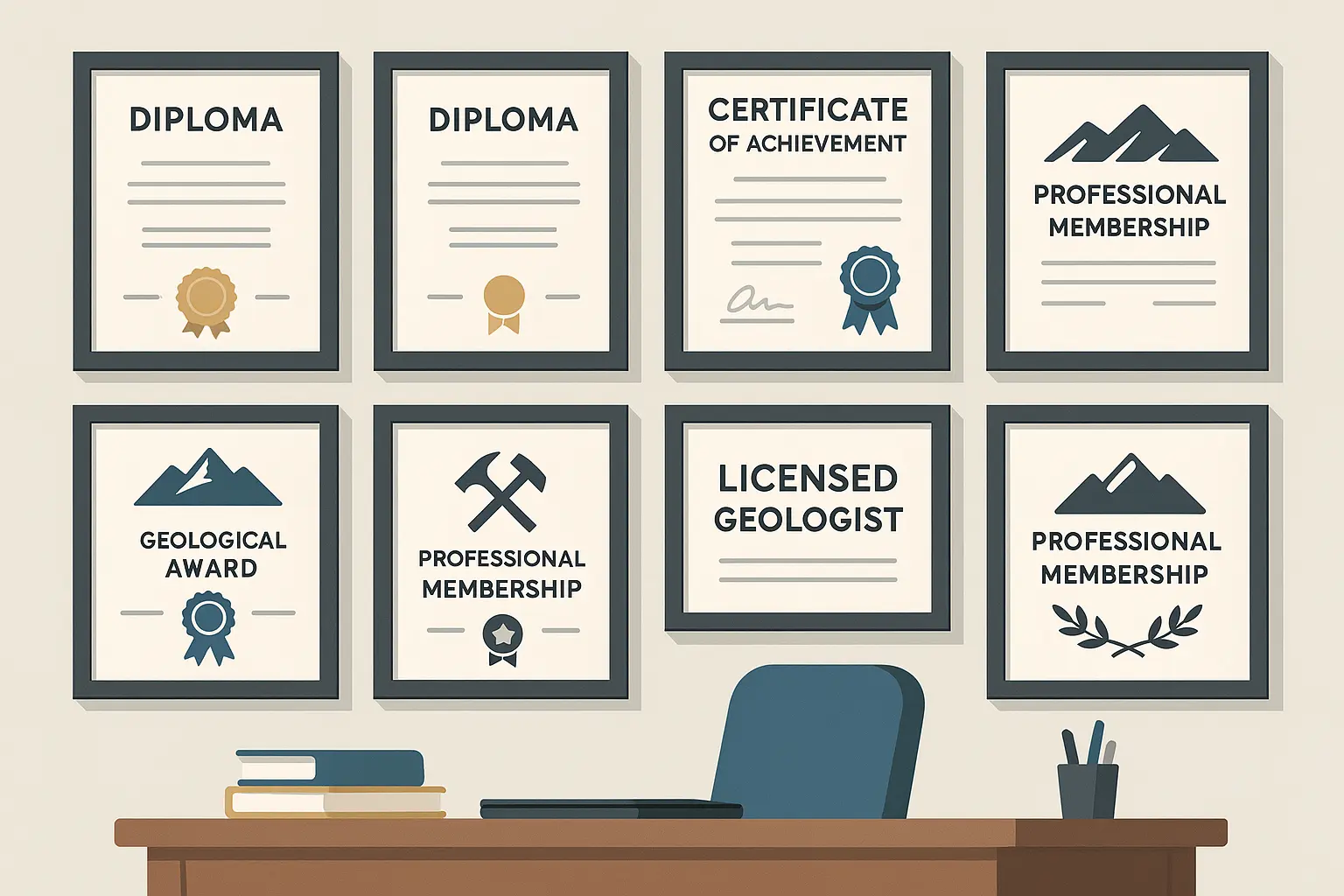Nobody warned me that becoming a geologist would be like choosing your own adventure book – every decision changes how long you’ll be in school. Sure, you could knock out an associate’s in two years and start working right away. Or you might fall in love with research and end up spending seven years earning a PhD.
Here’s what really surprised me: it’s not just about classroom time. Those summer field camps? They’re mandatory, and they’ll test everything you think you know about rocks. Want to get licensed? Tack on another 4-5 years of supervised work after graduation. Planning to specialize in something cool like hydrogeology? That might mean extra coursework.
According to recent data, 79% of geologists have a bachelor’s degree University of North Dakota, making this the most common educational path. But here’s the kicker – the journey to full professional status often extends well beyond graduation day.
Table of Contents
-
The Foundation Years: Associate Degree Pathway
-
The Standard Route: Bachelor’s Degree Deep Dive
-
Going Further: Graduate School Options
-
Getting Licensed: The Professional Geologist Journey
-
Real Career Paths and What They Actually Take
-
Alternative Routes That Might Surprise You
-
Industry Specializations Worth Considering
-
Money Matters: Is More Education Worth It?
-
Geographic Reality Check
-
Protecting Your Hard-Earned Credentials
TL;DR – The Quick Facts You Need
-
Associate degree: 2 years, gets you entry-level positions
-
Bachelor’s degree: 4 years, standard requirement for most geology jobs
-
Master’s degree: Additional 2-3 years, preferred for advanced positions
-
Doctoral degree: 4-7 years total, required for research and academia
-
Professional licensing: 4-5 years of supervised experience after graduation
-
Field work and lab time are mandatory components that can’t be rushed
-
Specialization choices affect both timeline and career opportunities
-
Transfer students and career changers may need extra time for prerequisites
Understanding the complete timeline for geological education helps you plan your career path, similar to how other degree programs vary in duration. For comparison, you might want to explore how long it takes to get a science degree to see how geology fits within the broader scientific education landscape.
The Foundation Years: Associate Degree Pathway
Look, I get it – jumping straight into a four-year program feels overwhelming. An associate degree lets you dip your toes in the water for just two years. You’ll hit the essentials: calculus (yes, it’s required), chemistry, physics, and some actual geology courses.
But here’s the reality check: your job options will be pretty limited. Think lab technician or field assistant roles. Still, it’s a smart move if you’re not sure geology is for you, or if you need to keep costs down while figuring things out.
Prerequisites That Actually Matter
Before you get to the fun rock stuff, you’ve got to survive the building blocks. Math through calculus isn’t negotiable – you’ll use it constantly for analyzing data and understanding geological processes. Same goes for chemistry and physics. I know it seems tedious, but trust me, these courses explain why rocks do what they do.
I met Sarah at a community college who took this route. She spent her first semester in College Algebra and General Chemistry, feeling pretty discouraged. But by the time she hit Physical Geology in her third semester, those foundations made everything click. Her classmates who rushed through the prereqs? They struggled hard.
The math and science aren’t just boxes to check – they’re your toolkit. You’ll use chemistry to understand mineral formation and physics to grasp how geological processes work. Without them, you’re just collecting pretty rocks.
Science Foundation Requirements
Basic chemistry and physics aren’t just academic hurdles – they explain why rocks form the way they do and how geological processes actually work. You’ll use these concepts constantly throughout your program, from understanding mineral formation to analyzing groundwater flow.
Mathematics Skills You Can’t Avoid
Calculus and statistics become your best friends when you’re measuring geological formations, modeling processes, and analyzing field data. These math skills separate geology from just rock collecting – they’re what make you a scientist.
Hands-On Learning That Sets Geology Apart
This is where geology gets exciting. From day one, you’re in labs identifying minerals, learning to use geological instruments, and analyzing real samples. It’s not a desk job, and your education reflects that.
You can’t rush this practical component – it takes time to develop the eye for identifying rocks and the hands-on skills with equipment. But this is what makes geology graduates valuable in the job market.
The hands-on nature of geological education makes it particularly valuable, especially when considering whether a college degree is worth the investment in today’s job market.
Laboratory Skills Development
You’ll spend significant time learning to identify minerals and rocks, master geological instruments, and analyze samples using microscopy and chemical testing. These lab skills become second nature and form the foundation of your professional toolkit.
The Standard Route: Bachelor’s Degree Deep Dive
Here’s where most people land – the four-year bachelor’s degree. You’ll need 120-128 credit hours, and this is where things get serious. Junior and senior years bring the heavy hitters: mineralogy, petrology, structural geology, stratigraphy. These aren’t just course names – they’re different lenses for understanding how Earth works.
The real test? Field camp. Picture 4-6 weeks in the middle of nowhere, applying everything you’ve learned to actual geological mapping. It’s intense, but it’s where you prove you can think like a geologist, not just memorize textbook facts.
|
Year |
Core Courses |
Credit Hours |
Key Skills Developed |
|---|---|---|---|
|
Freshman |
Physical Geology, Historical Geology, Chemistry, Calculus |
30-32 |
Basic geological concepts, scientific method |
|
Sophomore |
Mineralogy, Petrology, Structural Geology, Physics |
30-32 |
Rock/mineral identification, geological processes |
|
Junior |
Stratigraphy, Hydrogeology, Geochemistry, Electives |
30-32 |
Advanced analysis, specialization focus |
|
Senior |
Field Camp, Capstone Project, Advanced Electives |
30-32 |
Professional skills, independent research |
Core Curriculum That Shapes Your Thinking
Most programs let you specialize based on your interests. Environmental geology opens doors to consulting firms and government agencies. Petroleum geology leads to oil and gas companies. Choose wisely – this decision shapes your career path.
Advanced Field Methods That Matter
Field camps lasting 4-6 weeks during summer months represent the ultimate test of your geological knowledge. You’ll apply classroom theory to real geological mapping and analysis, often in remote locations where problem-solving skills become crucial.
Research Opportunities Worth Pursuing
Working alongside faculty on active geological investigations gives you a taste of professional research while potentially contributing to published studies. These experiences often influence career direction and provide valuable networking opportunities.
Capstone Projects That Prove Your Skills
Senior-year independent research projects demonstrate your mastery of geological principles, data collection, analysis, and scientific communication. This is where you prove you can think like a geologist, not just memorize facts.
Specialization Tracks That Define Your Future
Your specialization choice significantly impacts your job prospects and determines which industries will be most interested in hiring you. When you’re wondering what does a geologist actually do in these different specializations, the answer varies dramatically. Environmental geologists spend their days assessing contamination sites and designing cleanup strategies. Petroleum geologists analyze subsurface formations to locate oil and gas reserves. Hydrogeologists focus on groundwater systems and water resource management.
Environmental Geology Focus
Environmental geology concentrations require additional coursework in environmental science, groundwater hydrology, and contamination assessment. This specialization opens doors to consulting firms and government agencies dealing with environmental protection and cleanup.
Going Further: Graduate School Options
Only about 14% of geologists have a master’s degree University of North Dakota, which means advanced education really sets you apart. Graduate school takes 2-3 years and lets you become an expert in specific areas.
You’ve got two main paths: research-focused thesis programs or coursework-heavy professional master’s programs. The thesis route prepares you for PhD work or advanced research positions. Professional programs focus on industry skills and often include internships.
Master’s Degree Programs Worth Considering
Graduate study allows for deep specialization and is increasingly preferred by employers for advanced positions. You’ll choose between research-focused thesis programs or coursework-intensive professional master’s programs based on whether you want to pursue research or focus on applied industry skills.
Thesis vs. Non-Thesis Decision Points
Research-based thesis programs require 30-36 credit hours plus original research culminating in a defended thesis, preparing you for doctoral study or advanced research positions. Professional master’s programs focus on applied skills and industry-relevant coursework with internships or capstone projects instead.
Specialization Areas That Pay Off
Graduate programs offer concentrated study in petroleum geology, environmental consulting, hydrogeology, geophysics, or geological engineering. Your specialization choice directly impacts salary potential and job availability in different geographic regions.
Doctoral Programs for the Truly Committed
Here’s a reality check: only about 1% of geologists hold a Ph.D. University of North Dakota. PhD programs take 4-7 years total and are really for people who want to do research, teach at universities, or work in high-level consulting.
It’s a big commitment, but if you love research and want to contribute new knowledge to the field, it might be worth it.
Research Focus and Dissertation Reality
Doctoral candidates dedicate years to original research under faculty supervision, contributing new knowledge to geological sciences. This intensive process develops deep expertise but requires significant time commitment and self-motivation to complete successfully.
Getting Licensed: The Professional Geologist Journey
Here’s what nobody tells you upfront: getting your Professional Geologist license takes years beyond graduation. Most states require 4-5 years of supervised experience before you can even take the final licensing exam.
The process starts with the Fundamentals of Geology exam, usually taken during your senior year. Pass that, then spend the next several years working under a licensed professional, documenting everything you do. It’s a long road, but licensed geologists can legally sign off on technical reports and offer services to the public.
Understanding how to become a geologist professionally means recognizing that your education is just the beginning. The licensing process transforms you from someone with geological knowledge into a professional who can legally practice geology and sign off on technical reports.
Educational Requirements That Open Doors
Licensure typically requires a bachelor’s degree from an ABET-accredited program, though specific requirements vary by state. The Fundamentals of Geology exam is usually taken during your final undergraduate year or shortly after graduation.
Some states are pretty strict about this. “Florida requires five years of verified geological work experience, which includes a minimum of three of those years under the supervision of a licensed Florida Professional Geologist” Florida Department of Environmental Protection, showing how states maintain rigorous supervision standards for new professionals.
Fundamentals of Geology Exam Timing
This first licensing step involves passing the FG exam, typically taken during your final year of undergraduate study or shortly after graduation. Passing this exam while geological principles are fresh in your mind gives you a head start on the licensing process.
Experience Requirements You Can’t Rush
Most states require 4-5 years of progressive geological experience under licensed professional supervision before you can take the Practice of Geology exam. This supervised experience period teaches practical skills that classroom education simply can’t provide.
Professional Experience Checklist:
-
Document all geological work activities monthly
-
Ensure supervisor is properly licensed in your state
-
Maintain records of project types and responsibilities
-
Track continuing education hours annually
-
Prepare detailed experience summaries for license application
-
Collect supervisor evaluations and recommendations
-
Keep copies of all professional reports and analyses
Supervised Professional Experience Value
Entry-level geologists work under experienced professionals, gaining practical skills in site investigation, report writing, and client interaction. This mentorship period is crucial for developing professional judgment and technical competence.
Portfolio Development Process
Candidates must document their professional experience through detailed work examples, demonstrating competency in various aspects of geological practice. This portfolio becomes evidence of your professional growth and technical capabilities.
Continuing Education Reality
Licensed professionals must complete 15-30 professional development hours annually to maintain their credentials. This ongoing education requirement means your learning never really stops, but it keeps you current with evolving industry practices and technologies.
Real Career Paths and What They Actually Take
Fresh out of college, you’re looking at entry-level positions: staff geologist, environmental consultant, field technician. The pay isn’t amazing at first, but you’re learning the ropes.
Take Mike – he started as a staff geologist right after his bachelor’s degree. First year was mostly soil sampling and basic site work under supervision. By year three, he was leading small contamination investigations. After five years and getting his license, he became a project manager overseeing million-dollar cleanup projects.
With 5-10 years of experience, you can move into project management, senior consulting roles, or specialized technical positions. The key is developing business skills alongside your technical expertise.
Entry-Level Positions That Launch Careers
New geology graduates typically start as staff geologists, environmental consultants, or field technicians. These positions provide essential real-world experience while you’re still learning how to apply your education to actual geological problems.
Environmental Consulting Reality
Many new graduates begin in environmental consulting, conducting site assessments, monitoring groundwater, and supporting remediation projects. This field offers diverse project experience but can involve significant travel and outdoor work in various weather conditions.
Government Positions Worth Exploring
Federal and state agencies hire geology graduates for natural resource management, geological surveying, and environmental protection roles. Government positions often offer better work-life balance and benefits, though advancement may be slower than in private industry.
Mid-Career Advancement Opportunities
The job market for geologists continues to show positive trends, with recent Bureau of Labor Statistics data indicating that “jobs in geoscience will grow by 5% by 2033” Southern New Hampshire University, demonstrating steady demand for geological expertise across multiple industries.
Management Track Considerations
Experienced geologists often transition into project management, business development, or practice leadership roles within consulting firms or government agencies. This path requires developing people skills and business acumen beyond technical geological knowledge.
Alternative Routes That Might Surprise You
Some schools offer accelerated programs that compress four years into 3-3.5 years through summer coursework. It’s intense but gets you working faster and reduces costs.
Transfer students face unique challenges. Not all credits transfer equally, and you might need to repeat some courses to meet program standards. Plan for potentially adding 1-2 semesters to your timeline.
Accelerated Degree Programs
Some institutions offer accelerated bachelor’s programs completable in 3-3.5 years through summer coursework and intensive scheduling. These programs require dedication but can get you into the workforce faster while reducing overall education costs.
Summer Field Intensive Benefits
Students can compress traditional 4-year programs by taking advantage of summer field schools and intensive laboratory courses. Year-round enrollment allows you to maintain momentum in challenging subjects while reducing overall time to degree completion.
Transfer Student Realities
Students transferring from community colleges or changing majors face unique timeline considerations. Credit transfer evaluation and prerequisite alignment can significantly impact degree completion time, sometimes adding 1-2 semesters to your timeline.
Credit Transfer Evaluation Process
Transfer students must ensure prerequisite science and math courses align with geology program requirements. Not all credits transfer equally, and some courses may need to be repeated to meet specific program standards.
Major Change Timeline Impact
Students switching to geology from other disciplines may need additional prerequisite coursework, potentially adding 1-2 semesters to their degree timeline. However, some transferable skills from other majors can provide unique advantages in geological careers.
Industry Specializations Worth Considering
The daily work varies dramatically based on your specialization. Environmental geologists spend time at contaminated sites designing cleanup strategies. Petroleum geologists analyze subsurface formations to find oil and gas. Hydrogeologists focus on water resources and groundwater systems.
Professional geologists work across diverse industries including environmental consulting, petroleum exploration, mining, government agencies, and academic research. Emerging specializations in climate geology and geothermal energy development offer new career opportunities in growing fields.
|
Specialization |
Typical Entry Requirements |
Average Timeline |
Salary Range |
Job Growth |
|---|---|---|---|---|
|
Environmental Geology |
Bachelor’s + 2-3 years experience |
6-7 years total |
$65,000-$95,000 |
7% |
|
Petroleum Geology |
Bachelor’s + field experience |
5-6 years total |
$85,000-$150,000 |
3% |
|
Hydrogeology |
Bachelor’s + specialized training |
6-8 years total |
$70,000-$110,000 |
8% |
|
Geophysics |
Bachelor’s + advanced math |
5-7 years total |
$75,000-$120,000 |
5% |
|
Mining Geology |
Bachelor’s + industry experience |
5-6 years total |
$80,000- $130,000 |
4% |
What Geologists Actually Do Daily
Environmental geologists assess contamination sites and monitor groundwater quality, while exploration geologists locate mineral deposits and oil reserves using various geological and geophysical techniques. The day-to-day work varies dramatically based on your specialization and employer.
Environmental Geology Applications
Environmental geologists design drilling programs, collect soil and groundwater samples, and interpret subsurface conditions for environmental assessments. This work often involves site investigation procedures and remediation support for contaminated properties.
Natural Resource Exploration Work
Resource exploration requires extensive fieldwork including geological mapping, rock sampling, and geophysical surveys to identify promising development areas. Economic evaluation skills become crucial as you must understand both technical aspects and market viability of resource deposits.
Emerging Specializations Creating New Opportunities
New specializations keep emerging. Climate geology didn’t exist 20 years ago, but now it’s crucial for understanding how Earth’s climate has changed and predicting future conditions. Geothermal energy development is another growing field as we shift toward renewable energy.
Dr. Jennifer Chen is a perfect example – she completed her master’s in 2019 and now studies ancient climate records in ice cores. Her work helps predict sea level changes by understanding how ice sheets responded to past warming. It’s cutting-edge work that combines traditional geology with climate science.
Climate Geology Growing Importance
Geologists study past climate conditions through rock and sediment records to understand current climate change patterns and predict future conditions. This specialization combines traditional geological skills with climate science and environmental policy considerations.
Geothermal Energy Development Potential
Growing interest in renewable energy creates opportunities for geologists specializing in geothermal resource assessment and development. This field requires understanding of subsurface heat flow, fluid dynamics, and energy extraction technologies.
Money Matters: Is More Education Worth It?
Graduate school costs money, but master’s degree holders typically earn 15-25% more than bachelor’s graduates. PhD holders can command even higher salaries in specialized roles.
The trick is finding funding – teaching assistantships, research assistantships, and industry partnerships can help offset costs while giving you valuable experience. Many students complete graduate degrees with minimal debt if they’re strategic about funding.
Graduate School Return on Investment
The financial benefits of graduate education vary by specialization and career path. Teaching assistantships, research assistantships, and industry partnerships can help offset graduate school costs while providing valuable professional experience that enhances your resume.
Graduate School Funding Checklist:
-
Research teaching assistantship opportunities in your program
-
Apply for research assistantships with faculty members
-
Investigate industry-sponsored graduate fellowships
-
Consider part-time programs if working full-time
-
Calculate total cost including living expenses and lost wages
-
Compare potential salary increases against education costs
-
Evaluate loan forgiveness programs for public service careers
Funding Graduate Studies Options
Teaching assistantships, research assistantships, and industry partnerships can help offset graduate school costs while providing valuable professional experience. Many students can complete graduate degrees with minimal debt if they secure funding opportunities.
Professional Development Investment Strategy
Continuing education, professional society memberships, and conference attendance represent ongoing investments in career advancement. These costs continue throughout your career but are essential for staying current and building professional networks.
Geographic Reality Check
Where you want to live matters a lot for geology careers. Oil and gas opportunities cluster in Texas, North Dakota, and Alaska. Environmental consulting exists everywhere but demand varies. Mining jobs concentrate around active mining regions.
Your location affects everything from internship opportunities to career advancement timelines. Some regions offer more entry-level positions, while others might require relocation for optimal career development.
Regional Industry Concentrations
Oil and gas opportunities concentrate in Texas, North Dakota, and Alaska, while environmental consulting opportunities exist nationwide. Understanding regional industry concentrations helps you plan your education and early career moves strategically.
Location Impact on Career Timeline
Your geographic location affects both educational opportunities and career advancement timelines. Some regions offer more internships, field experience, and entry-level positions, while others may require relocation for optimal career development.
Protecting Your Hard-Earned Credentials
After years of field work and office moves, many geologists find themselves needing replacement diplomas or transcripts. Keep backup copies of important documents – you never know when you’ll need them for job applications or professional licensing.
After investing years in your geology education, protecting and properly displaying your credentials becomes important for career advancement. Whether you need backup copies for professional display or want to keep originals safe while showcasing achievements at work, having reliable access to your academic documents matters for your professional image and career opportunities.
Many geology professionals find themselves needing replacement diplomas after years of field work and office relocations, making credential backup an important consideration early in your career.
ValidGrad understands the value of your geological education credentials and offers high-quality replica diplomas and transcripts when you need them. With over 10 different templates and custom design capabilities, you can preserve and display your achievements with the same attention to detail you applied to your studies. Their fast turnaround time means you won’t wait weeks through university bureaucracy when you need replacement documents for job applications or professional display.
Professional geologists often need to display their credentials professionally in office settings, especially when meeting with clients or regulatory agencies who need to verify qualifications.
Final Thoughts
The timeline for getting a geology degree isn’t just about counting semesters – it’s about building toward your specific career goals. Whether you start with a two-year associate degree or commit to a full doctoral program, align your educational path with your professional dreams and financial reality.
Your education doesn’t end at graduation either. Professional licensing, continuing education, and specialization development continue throughout your career. The geological field evolves constantly, creating opportunities that didn’t exist when you started.
Don’t let the timeline discourage you. Every year you invest opens doors to careers combining outdoor adventure, scientific discovery, and meaningful environmental work. The question isn’t just how long it takes – it’s whether you’re ready for a career that keeps you learning and exploring for decades.
Remember that your education doesn’t end with graduation. Professional licensing, continuing education, and specialization development continue throughout your career. The geological field evolves constantly, with new technologies, environmental challenges, and energy needs creating opportunities that didn’t exist when you started your studies.
Most importantly, don’t let the timeline discourage you. Every year you invest in geological education opens doors to careers that combine outdoor adventure, scientific discovery, and meaningful environmental work. The question isn’t just how long it takes – it’s whether you’re ready for a career that keeps you learning and exploring for decades to come.

